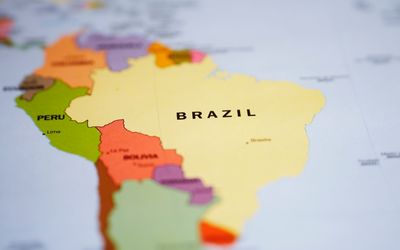Source:

South Africa must not forget Latin America
by Ray Hartley,
2013-12-15 08:48:05.0
IN the rush to build relationships with rising industrial powers China and India, South Africa may be ignoring the potential of a stronger relationship with Latin America.
For one thing, many of the countries on the two continents share a similar historical trajectory: colonisation followed by fraught decades of independence during which coups and poor economic choices led to economic stagnation and greater poverty.
For another, many of these countries face similar challenges in agriculture, mining and the need to shift economies forward at a much faster pace.
A recent think-tank, which was attended by among others former Nigerian president Olusegun Obasanjo, former Spanish prime minister Jose Maria Aznar and former Costa Rican president Miguel Angel Rodriguez, explored how the two continents could begin to work together.
The meeting, under the auspices of the Brenthurst Foundation, was a low-key affair at the Oppenheimers’ Tswalu game reserve in the Northern Cape.
Obasanjo set the scene by pointing out that Africa and south and central America shared a shameful truth: they were the regions with the highest level of inequality in the world.
Particularly perplexing was that so many “look at the future and have no hope”. It would be useful to approach the discussion by asking what could be done so that people would say: “I have a stake in that society. I fee l that I own that society.”
Obasanjo’s concerns appeared to resonate with a recent International Monetary Fund report on the continent’s largest economy, South Africa. It said that an “insider-outsider” dynamic had led to the conglomerates and unions forging a labour market that kept the unemployed marginalised — “without hope” — to borrow Obasanjo’s phrase.
He said the view that these outsiders had was: “We do not understand the past, the present is confusing to us, the future is bleak.”
These days Obasanjo — who made the transition from military ruler of Nigeria to opposition leader and elected president — plays the role of senior statesman. He travels the continent to advise on building open, competitive societies.
Aznar said that there was potential for the countries of the Atlantic basin “to share a system of values” -democracy, freedom and liberty, and to build economically free societies.
“In my view, inequality is one consequence of the lack of good institutional systems. For any country in any region of the world, the first question is this institutional system.
“If you look at the map, and you choose the countries with better institutions, you will choose the countries with better economies.”
Chairing a session on reform and growth, Michael Spicer of Business Leadership South Africa asked: “What are the trade-offs between redistribution and growth?”
Rodriguez spoke of Latin America’s “lost years” after World War 2 when protected local industries and closed markets led to economic decline. “It’s only when you are in the swimming pool that you learn to swim,” he said.
Among the participants was Donald Kaberuka, the president of the African Development Bank.
He sketched how the continent had moved from “exuberance after independence” in the 1960s to the despair of the 1970s when the first Afro-Marxists had attempted social engineering.
The resulting “debt explosion” had led the World Bank to intervene in the 1980s with structural adjustment, which had the consequence of weakening state institutions.
“Throughout Africa we destroyed state institutions in the belief that the markets would fix everything.”
Kaberuka observed drily how two seismic events — the collapse of the Berlin Wall and the collapse of Lehman Brothers — had ended the era of “ideological economies”.
It was finally possible to base decisions on “what works and what doesn’t work”.
Africa was now turning the corner, and the new catch phrase was “Africa rising”, but he added: “You won’t find me saying that.
“You should not confuse a turning point with a tipping point.”
Speakers from Africa, Europe and Latin America identified the strength of democratic institutions as the key to economic growth and public confidence in government.
The former Zimbabwean finance minister, Tendai Biti, spoke of the need to stop scoring “self-induced own goals”.
“Fifty years after independence, this is still a big issue — the issue of leadership,” he said.
• This article was first published in Sunday Times: Business Times

Picture: THINKSTOCK
IN the rush to build relationships with rising industrial powers China and India, South Africa may be ignoring the potential of a stronger relationship with Latin America.
For one thing, many of the countries on the two continents share a similar historical trajectory: colonisation followed by fraught decades of independence during which coups and poor economic choices led to economic stagnation and greater poverty.
For another, many of these countries face similar challenges in agriculture, mining and the need to shift economies forward at a much faster pace.
A recent think-tank, which was attended by among others former Nigerian president Olusegun Obasanjo, former Spanish prime minister Jose Maria Aznar and former Costa Rican president Miguel Angel Rodriguez, explored how the two continents could begin to work together.
The meeting, under the auspices of the Brenthurst Foundation, was a low-key affair at the Oppenheimers’ Tswalu game reserve in the Northern Cape.
Obasanjo set the scene by pointing out that Africa and south and central America shared a shameful truth: they were the regions with the highest level of inequality in the world.
Particularly perplexing was that so many “look at the future and have no hope”. It would be useful to approach the discussion by asking what could be done so that people would say: “I have a stake in that society. I fee l that I own that society.”
Obasanjo’s concerns appeared to resonate with a recent International Monetary Fund report on the continent’s largest economy, South Africa. It said that an “insider-outsider” dynamic had led to the conglomerates and unions forging a labour market that kept the unemployed marginalised — “without hope” — to borrow Obasanjo’s phrase.
He said the view that these outsiders had was: “We do not understand the past, the present is confusing to us, the future is bleak.”
These days Obasanjo — who made the transition from military ruler of Nigeria to opposition leader and elected president — plays the role of senior statesman. He travels the continent to advise on building open, competitive societies.
Aznar said that there was potential for the countries of the Atlantic basin “to share a system of values” -democracy, freedom and liberty, and to build economically free societies.
“In my view, inequality is one consequence of the lack of good institutional systems. For any country in any region of the world, the first question is this institutional system.
“If you look at the map, and you choose the countries with better institutions, you will choose the countries with better economies.”
Chairing a session on reform and growth, Michael Spicer of Business Leadership South Africa asked: “What are the trade-offs between redistribution and growth?”
Rodriguez spoke of Latin America’s “lost years” after World War 2 when protected local industries and closed markets led to economic decline. “It’s only when you are in the swimming pool that you learn to swim,” he said.
Among the participants was Donald Kaberuka, the president of the African Development Bank.
He sketched how the continent had moved from “exuberance after independence” in the 1960s to the despair of the 1970s when the first Afro-Marxists had attempted social engineering.
The resulting “debt explosion” had led the World Bank to intervene in the 1980s with structural adjustment, which had the consequence of weakening state institutions.
“Throughout Africa we destroyed state institutions in the belief that the markets would fix everything.”
Kaberuka observed drily how two seismic events — the collapse of the Berlin Wall and the collapse of Lehman Brothers — had ended the era of “ideological economies”.
It was finally possible to base decisions on “what works and what doesn’t work”.
Africa was now turning the corner, and the new catch phrase was “Africa rising”, but he added: “You won’t find me saying that.
“You should not confuse a turning point with a tipping point.”
Speakers from Africa, Europe and Latin America identified the strength of democratic institutions as the key to economic growth and public confidence in government.
The former Zimbabwean finance minister, Tendai Biti, spoke of the need to stop scoring “self-induced own goals”.
“Fifty years after independence, this is still a big issue — the issue of leadership,” he said.
• This article was first published in Sunday Times: Business Times























Change: -0.47%
Change: -0.57%
Change: -1.76%
Change: -0.34%
Change: 0.02%
Data supplied by Profile Data
Change: -1.49%
Change: -0.04%
Change: -0.47%
Change: 0.00%
Change: 0.08%
Data supplied by Profile Data
Change: 0.16%
Change: 0.61%
Change: 0.12%
Change: -0.29%
Change: 0.82%
Data supplied by Profile Data
Change: 0.25%
Change: -0.42%
Change: 0.20%
Change: -1.57%
Change: -0.96%
Data supplied by Profile Data